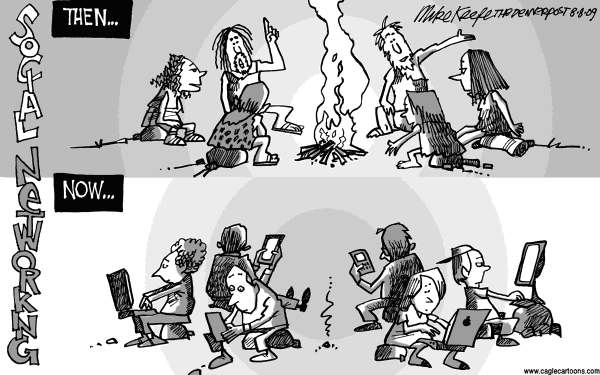People who know me, the ones who I have met, the ones who follow my tweets, the ones who read this blog, know that I am obsessed with identity. I have written on the subject extensively on this blog, and I have explored the subject in depth on my personal blog. While on the surface it may appear that I am being a narcissistic ego-maniac, I assure you my intentions are good. For the last seven years, I have been conducting an experiment of sorts.
What do we feel comfortable sharing online? What is or should be private? What can we gain by over-sharing? How does this theory of openness help us connect to others? How does it affect community? What is everyone so afraid of? Should I be?
There are countless other questions, but you get the point. I have tried to share as much as I can, to see if by sharing every aspect of my life, I can build an authentic “brand.” One that will help me gather a tribe of like-minded people who will not only help me learn, but who will also become close friends. I am hoping that by revealing as much as I can, you will help me identify the gaps and help complete me. See this stuff is deep.
None of what I have written so far is new, so why write this post again? Firstly, I wanted to share my second online stalking! A few years ago, Clarence Fisher’s English class, investigated my online footprint and discovered some interesting things. No surprises. They got a superficial, yet accurate, image of who I was in 2010.
I am happy to announce that I have been stalked a second time. This time as a part of UMW Digital Identity course taught by Martha Burtis. One of her students was assigned to dig up all she could about who I am now. You can read her complete reflection here, but there is not much out of the ordinary this time around either. Beyond being impressed that she was able to identify my daughter’s addiction to Nutella, there was little in what she found beyond my blog About Me page.
She asked me to answer some questions in a recorded interview, which I do at the end of this video. Her introduction is hilarious, despite the poor sound. The interview questions at the end of clip, however, sound fine. The worst kind of criminal–an educator…
One of the biggest criticism of social media and online sharing is that it is somehow inherently false and duplicitous. Because we can choose what we share, the thinking goes, we only share the best of who we are. We somehow build these better alter-egos of ourselves. We never shed light on our faults, show ourselves being ugly, or delve too deep into the darkness.
I am sure there is truth to this. This is what I want to challenge. I am not sure where the boundaries are, but I am very curious. I have tried to be as open as possible, but I am sure even I have held back. I know there are some definite no-nos. Never talk about sexuality. I will promote gay rights and gender equality, because I feel they are human rights, but personal thoughts on sexuality is a no go for me.
I have begun to share less about religion these days. I am openly atheist, but I hope that as I get older, I am becoming more tolerant and focusing on my own slow Zen practice. It’ a process, a journey. I am on it. Enough said.
Politics? I used to be more outspoken, but even my energy in that field has been subdued. I am trying to sort myself out first. I will speak up about injustice and criticize system I find unfair, but I seldom get into heated debates these days.
What is the next step of this experiment? How else can I dance on the edge of private vs public, personal vs professional? This is where you come in. I need your help. I am going to ask you a few questions. I do not expect you to answer them. I would just like you to think about where your boundaries are? What would you never share online? What kinds of questions are just too much? Then I want you to ask me those questions. Leave them in the comments below.
I am not asking you to ask me these questions, because I will necessarily answer them; I just want to see how they affect my comfort zone. I want to sketch out my no-fly zone. Identify the boundaries. I am also curious what you feel is out of bounds. I want to test the waters. I am expecting that based on your culture and personality we will have a wide range of ideas in regards to privacy.
What is too much?
What do you feel is too private to share?
What would make you feel uncomfortable?
Thanks for playing along.





